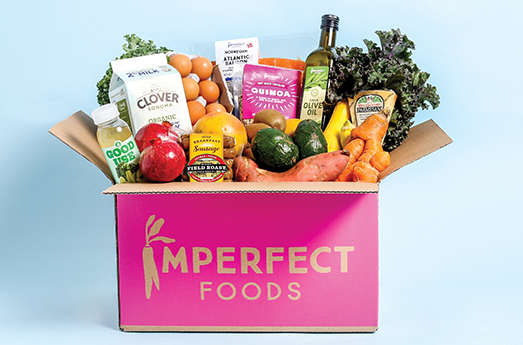
Picture Imperfect
Imperfect Foods Serves Tucson, Helps Environment
By Valerie Vinyard
Nothing is perfect.
Imperfect Foods embraces food imperfections. By doing so, the San Francisco-based company, which has expanded into Tucson, combats food waste and helps the environment.
Imperfect Foods extended its two-year corporate presence in Tucson by beginning local delivery in October of weekly shipments of minimally processed foods. The company boasts customers in 38 states, including 35 major metropolitan areas. Imperfect Foods has more than 400,000 customers nationwide and plans to enter 30 additional markets by the end of 2021.
In their weekly shipment, Imperfect Foods subscribers might receive a curved cucumber or a bag of brown rice that contains some broken grains from the milling process or perhaps a bag of almonds with some harmless markings on them.
The company has capitalized on foods’ inherent imperfections by featuring products that aren’t necessarily picture perfect. This, in turn, can save customers money. Imperfect Foods said it can save customers an average of 30% over grocery store prices, depending on the order.
The nutritional value is not diminished, and it helps growers save more food from being needlessly discarded.
Reducing Waste, Growing Business
According to ReFED, a national nonprofit working to end food loss and waste across the United States, 40% of the nation’s food goes uneaten. Some $218 billion in food is discarded every year and an additional 20 billion pounds of produce goes unharvested or unsold every year.
Those figures are anathema to Imperfect Foods founders Ben Chesler, Ben Simon and Ron Clark. Chesler and Simon have been working to eradicate food waste since their college days at the University of Maryland, when the two founded a nonprofit called Food Recovery Network, which saved food from going to waste on campus. Food Recovery Network, which is America’s largest student movement against hunger, has grown to 230 chapters nationwide and has recovered more than 3 million pounds of food.
In 2015, the trio initially called their new company Imperfect Produce. After expanding to offer other food categories, the founders changed the name to Imperfect Foods in August 2019.
Maureen Shea, Imperfect Foods chief experience officer, or CXO, has been with the company since January 2018. She said the “imperfect” part of the product could be a difference in size or a blemish.
“You might see some scarring on the outside of an orange,” Shea said. “I’ve seen a giant lemon. It makes you really aware of how uniform our produce has become.
“They have all the nutrients and all the flavor; they just have some unique characteristics.”
Like most companies that were disrupted when the pandemic started in the United States, Imperfect Foods had to adapt. “2020 started as a really strong year for us, and then COVID hit,” Shea said. “It was a dramatic shift for everyone.”
The “dramatic” part ended up working in the company’s favor, as many people didn’t want to venture out to shop unless it was absolutely necessary. That meant prepared food purveyers as well as grocers saw a huge uptick in deliveries.
“For us, it really was an incredible growth,” said Shea, adding that the company saw a 40% rise in its active base due to COVID-19 stay-at-home measures. “Folks either did not want to go out or could not go out.”
Shea recalled the surplus of milk during the initial phase of COVID-19. She said Imperfect Foods was able to repurpose some of that milk into cheese.
“There are opportunities all over the place in order to save product,” she said.
A Move to Tucson
In mid-2018, Shea said the company was looking for a hub for its customer care team.
“Sun Corridor Inc. provided one of the most thoughtful and comprehensive site visits that I’ve experienced in my career, and shone an impressive spotlight on Tucson’s culinary and sustainability efforts,” Shea said. “The Sun Corridor team left no stone unturned to recognize our unique business needs, and we were thrilled to call Tucson home after just a few months.”
She noted that the company was on the brink of national expansion, so it was important to find a passionate staff who believed in Imperfect Foods’ mission.
“Tucson’s firm citywide commitments to foster sustainability and creative food cultures stuck out right away, and we’ve found great value over the years working with the Tucson community to actualize kindred goals to better our planet,” Shea said.
The company’s 25,000-square-foot building in Tucson is located off Valencia Road near the airport and opened in 2019. The food, though, comes from Imperfect Foods’ refrigerated facility and fulfillment center in Los Angeles. The company has added over 125 jobs in the Tucson area with plans to eventually employ a total of 350.
How Delivery Works
A regular food box starts at $16, which includes “fresh, conventional produce,” while an organic box starts at $24 and includes organically grown produce. No matter how much you order or spend, a $4.99 delivery charge will be added.
The company sources surplus food and imperfect produce directly from farmers, growers and food purveyors. On rare occasions, Imperfect Foods will substitute similar items if inventory runs out. For now, the company doesn’t offer alcohol.





